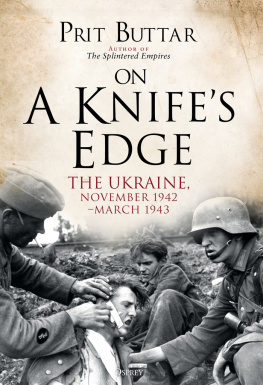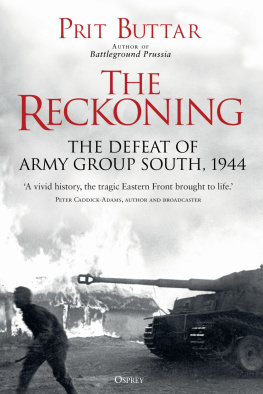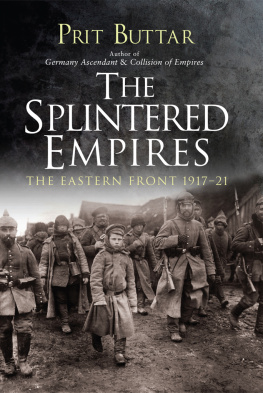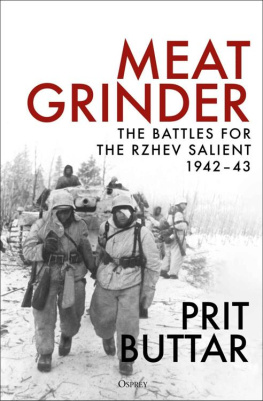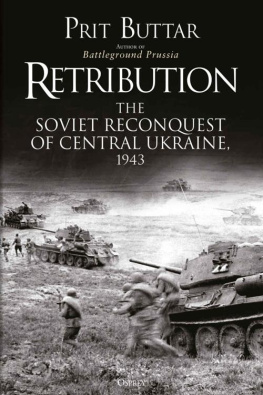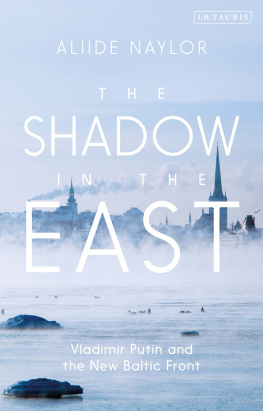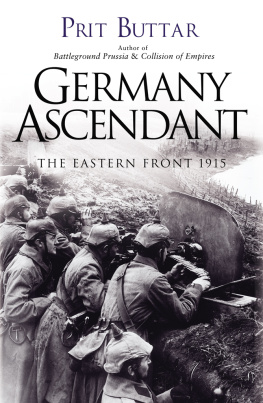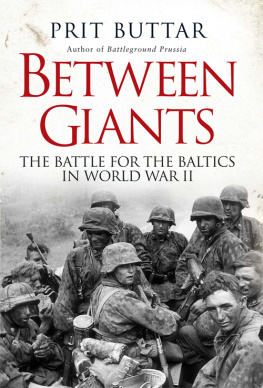Prit Buttar - Between Giants: The Battle for the Baltics in World War II
Here you can read online Prit Buttar - Between Giants: The Battle for the Baltics in World War II full text of the book (entire story) in english for free. Download pdf and epub, get meaning, cover and reviews about this ebook. year: 2013, publisher: Osprey Publishing, genre: Politics. Description of the work, (preface) as well as reviews are available. Best literature library LitArk.com created for fans of good reading and offers a wide selection of genres:
Romance novel
Science fiction
Adventure
Detective
Science
History
Home and family
Prose
Art
Politics
Computer
Non-fiction
Religion
Business
Children
Humor
Choose a favorite category and find really read worthwhile books. Enjoy immersion in the world of imagination, feel the emotions of the characters or learn something new for yourself, make an fascinating discovery.

- Book:Between Giants: The Battle for the Baltics in World War II
- Author:
- Publisher:Osprey Publishing
- Genre:
- Year:2013
- Rating:5 / 5
- Favourites:Add to favourites
- Your mark:
- 100
- 1
- 2
- 3
- 4
- 5
Between Giants: The Battle for the Baltics in World War II: summary, description and annotation
We offer to read an annotation, description, summary or preface (depends on what the author of the book "Between Giants: The Battle for the Baltics in World War II" wrote himself). If you haven't found the necessary information about the book — write in the comments, we will try to find it.
Prit Buttar: author's other books
Who wrote Between Giants: The Battle for the Baltics in World War II? Find out the surname, the name of the author of the book and a list of all author's works by series.
Between Giants: The Battle for the Baltics in World War II — read online for free the complete book (whole text) full work
Below is the text of the book, divided by pages. System saving the place of the last page read, allows you to conveniently read the book "Between Giants: The Battle for the Baltics in World War II" online for free, without having to search again every time where you left off. Put a bookmark, and you can go to the page where you finished reading at any time.
Font size:
Interval:
Bookmark:
THE BATTLE FOR THE BALTICS IN WORLD WAR II
PRIT BUTTAR
DEDICATION
For Dan
BETWEEN PAGES
Molotov and Ribbentrop. (Bundesarchiv Bild)
Georg von Kchler. (Bundesarchiv Bild)
Alfred Rosenberg. (Bundesarchiv Bild)
Ernst Busch. (Bundesarchiv Bild)
Hoepner and von Leeb. (Bundesarchiv Bild)
Georg-Hans Reinhardt. (Bundesarchiv Bild)
Erich von Manstein. (Bundesarchiv Bild)
Hyazinth von Strachwitz. (Bundesarchiv Bild)
Otto Carius. (Bundesarchiv Bild)
Voldemars Veiss. (Bundesarchiv Bild)
Johannes Freissner. (Bundesarchiv Bild)
BETWEEN PAGES
Felix Steiner. (Bundesarchiv Bild)
Govorov and Bagramian. (Getty Images)
Lindemann. (Topfoto)
Yeremenko. (Topfoto)
Ants Kaljurand. (Estonian State Archives)
Latvian SS volunteers. (Bundesarchiv Bild)
Heavy-machine gun position in Courland. (Bundesarchiv Bild)
Russian soldiers near Riga. (Topfoto)
German soldiers in Estonia. (Topfoto)
Riga, post liberation. (Topfoto)
German retreat from Riga. (Topfoto)
Fighting in the Courland Pocket. (Topfoto)
Gateway to Latvia. (Topfoto)
Estonian recruitment posters. (Authors Collection)
Inevitably, a book such as this is only possible as a result of the generous help of many people.
My good friend David Clarke kindly loaned me several books, which I would otherwise have struggled to obtain. Indeed, David was responsible many years ago for first introducing me to Operations Doppelkopf and Csar, my first steps on the road that led to this book. Tom Houlihan, of www.mapsatwar.us, provided invaluable help and showed great patience when working with me on the maps. I am also hugely grateful to Irina Dovbush, who helped me find many of the Soviet sources that I used.
My agent, Robert Dudley, was as always a source of professional advice and personal encouragement. The staff at Osprey, particularly Kate Moore, Marcus Cowper and Emily Holmes, were as professional and as helpful as anyone could wish.
As usual, my family showed huge forbearance with me as I worked on this book, and I am eternally grateful to them.
Baltic States
Juozas Ambrazeviius appointed as acting prime minister of Lithuania after the German invasion in 1941.
Oskars Dankers appointed by the Germans in July 1941 as the leader of the future Latvian administration.
Augusts Kirhenteins government leader in Latvia following the Soviet invasion in June 1940.
Petras Kubilinas appointed by the Germans in July 1941 as General Counsel in Lithuania, implementing German policies, particularly involved in recruiting Lithuanians for German forces.
Hjalmar Me appointed by the Germans in July 1941 to run a directorate in Estonia implementing German policies.
Antanas Merkys prime minister of Lithuania in 1939; removed in June 1940.
Vincas Mickeviius Lithuanian Foreign Minister following the 1940 Soviet invasion; he remained in post for less than a month.
Ladas Natkeviius Lithuanian ambassador to Moscow in 1939.
Justas Paleckis leader of Lithuania following the 1940 Soviet invasion.
Konstantin Pts Estonias head of state on the outbreak of war in 1939; he was forced to resign in mid-July 1940.
Karl Selter Estonian Foreign Minister in 1939.
Antanas Smetona leader of Lithuania on the outbreak of war in 1939; in June 1940 he fled to Germany, and onwards to the United States.
Krlis Ulmanis Latvias head of state in 1939; he was forced to resign in mid-July 1940.
Juozas Urbys Lithuanian Foreign Minister from 1938 to 1940.
Johannes Vares Estonian Prime Minister following the 1940 Soviet invasion.
German
General Clemens Betzel commander of IV Panzer Division during 1944; he and his division played a key part in operations Doppelkopf and Csar and in the fighting for Courland from October 1944 to January 1945.
Generalmajor Erich Brandenberger commander of 8th Panzer Division during Operation Barbarossa.
Generalfeldmarschall Walther von Brauchitsch commander of the German Army in 1941.
Generaloberst (from July 1940), later Generalfeldmarschall (from February 1943) Ernst Busch commander of 16th Army during Operation Barbarossa; commanded Army Group Centre during the fighting around Narva of JanuaryApril 1944.
Oberst Hans Christern commander of the 4th Panzer Divisions 35th Panzer Regiment; he took command of 4th Panzer Division during Betzels temporary absence in December 1944.
Generaloberst Johannes Friessner commander of Army Group North during July 1944, replacing Lindemann, but handing over to Schrner by the end of the month.
Generalmajor Rdiger von der Goltz German commander in Latvia in 191819.
Generaloberst Heinz Guderian chief of staff at German Army High Command (OKH).
General Christian Hansen commander of 16th Army in 1944.
Reinhard Heydrich head of the Reichssicherheitshauptamt (Reich Main Security Administration or RSHA).
Generaloberst Erich Hoepner commander of 4th Panzer Group, Army Group North, during Operation Barbarossa.
Oberst Hermann Hoth commander of 3rd Panzer Group, Army Group Centre, during Operation Barbarossa.
SS-Standartenfhrer Karl Jger commander of Einsatzkommando 3 from summer 1941; he was appointed commander of the Security Police and Sicherheitsdienst (security department, or SD) in Lithuania at the same time, and remained in Lithuania for two years. He wrote the Jger Report, a detailed account of the killings of the Jews in the Kaunas ghetto during the second half of 1941.
Generaloberst Georg von Kchler commander of 18th Army during Operation Barbarossa. He commanded Army Group North after the dismissal of Leeb in December 1941, but was dismissed in January 1944, and replaced by Model.
Generalfeldmarschall Wilhelm Ritter von Leeb commander of Army Group North, the main military command in the Baltic region, comprising 16th Army, 18th Army and 4th Panzer Group, at the start of Operation Barbarossa.
Generaloberst Georg Lindemann commander of 18th Army from January 1942 to March 1944; from end March until July 1944 he led Army Group North.
General (from June 1940), later Generalfeldmarschall (from July 1942) Erich von Manstein commander of LVI Panzer Corps during Operation Barbarossa. Generalfeldmarschall Walter Model commander of Army Group North from January 1944, when he succeeded Kchler; he was promoted to field marshal two months later. On 31 March 1944 he was moved to Army Group North Ukraine and replaced at Army Group North by Lindemann; in June, he assumed command of Army Group Centre following Operation Bagration. He was transferred to the Western Front in August 1944, and was followed as commander of Army Group Centre by Reinhardt.
General Georg-Hans Reinhardt commander of XLI Panzer Corps at the start of Operation Barbarossa. Promoted to Generaloberst, he commanded 3rd Panzer Army during the fighting around Vilnius in July 1944. In August 1944 he replaced Model as commander of Army Group Centre.
Joachim von Ribbentrop German Foreign Minister 193845; he negotiated the MolotovRibbentrop Pact with the Soviet Union.
Alfred Rosenberg a leading National Socialist, with a strong interest in racial theory; strongly anti-Semitic and anti-Bolshevik, he was highly influential in the development of Nazi racial ideology, and his ideas played a significant part in
Font size:
Interval:
Bookmark:
Similar books «Between Giants: The Battle for the Baltics in World War II»
Look at similar books to Between Giants: The Battle for the Baltics in World War II. We have selected literature similar in name and meaning in the hope of providing readers with more options to find new, interesting, not yet read works.
Discussion, reviews of the book Between Giants: The Battle for the Baltics in World War II and just readers' own opinions. Leave your comments, write what you think about the work, its meaning or the main characters. Specify what exactly you liked and what you didn't like, and why you think so.

